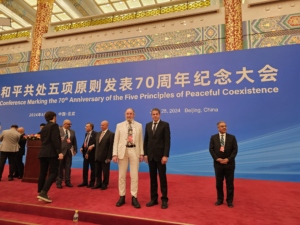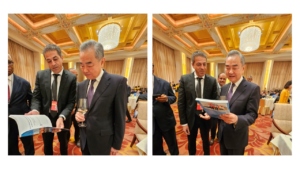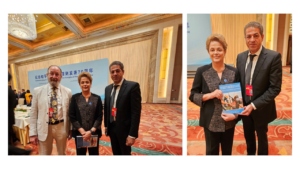The Chairman of the Belt and Institute in Sweden (BRIX), Stepehen Brawer, and Vice-Chairman Hussein Askary were among the several hundred guest joining The President of the People’s Republic of China, Xi Jinping, Premier Li Qiang and the top leadership of the country on June 28 celebrating the 70th Anniversary of the declaration of the Five Principles of Peaceful Coexistence. The event, especially the speech by President Xi marked a historic landmark in both China’s relationship to the world and the importance of these five principles for world peace and stability given the precarious situation the world finds itself in at this moment of history.
While the world was watching the debate between the two main contenders to the post of the President of the United States, President Biden and his rival Donald Trump, which even American mainstream media described as “a horror show”, a dialog of a different nature was going on simultaneously in Beijing on June 28. The celebration of the 70th anniversary of the joint statement of the Five Principles of Peaceful Coexistence took place as a whole day-event, starting with a historic speech by President Xi Jinping in the morning at the Great Hall of the People.
The joint statement declaring the Five Principles was signed on June 28, 1954, by the Chinese Premier Zhou Enlai and India’s Prime Minister Jawahar Lal Nehru. On June 29, the same statement was signed with Myanmar’s (then Burma) Prime Minister U Nu. The Five Principles of Peaceful Coexistence became the guiding principles in China’s bilateral relationship with its neighbours, but then later were formally proposed as the norms for handling international relations. In 1955 the Asian-African Conference convened in Bandung, Indonesia adopted Ten Principles for conducting international relations, in which the Five Principles of Peaceful Co-Existence were included. After World War II, many Asian and African countries gained independence from colonial rule and were aspiring to build an international relationship based on equality and mutual respect. Besides, in a world dominated by the Cold War between the West and the Soviet Union, these countries decided to be non-aligned. It was in this context then Chinese Premier Zhou Enlai first proposed the Five Principles of Peaceful Coexistence in 1953 during negotiations with the Indian government over border issues regarding Xizang (Tibet).
The Five Principles of Peaceful Coexistence are:
- Mutual respect for each other’s territorial integrity and sovereignty.
- Mutual non-aggression.
- Mutual non-interference in each other’s internal affairs.
- equality and co-operation for mutual benefit.
- peaceful coexistence and resolving disputes through diplomacy.
It is remarkable that these principles are in harmony with the principles of the Peace of Westphalia and the United Nations Charter and reinforce them. They have been the main principles and practices of China’s foreign policy, not only with its neighbours, but all other nations. However, given the dangerous world situation with increasing military conflicts of regional and potentially global nature such as the Israeli war on the Palestinian people and Russia’s war with Ukraine where the latter is considered a proxy of NATO and the West, these principles are necessary to discuss and use as part of global peace-making efforts.
The Events of June 28
The celebration of the 70th anniversary on June 28 included three main events. First was the opening ceremony at the Great Hall of the People in the morning. It was followed by luncheon hosted by Chinese Minister of Foreign Affairs, Wang Yi, in the magnificent Diaoyutai State Guest House, followed by three sub-forums in the same venue where former international and Chinese senior officials and experts to discuss the different features of the Five Principles and their importance for the world today.
The Chairman of the Belt and Road Institute in Sweden, Stephen Brawer, and Vice-Chairman, Hussein Askary, participated in all three events and were among the several hundred invited guests, featuring current and former heads of states, senior officials, diplomats, and scholars and experts from every part of the world. The events concluded with the issuing of formal declaration.



At the first event, President Xi was introduced by Premier Li Qiang, who moderated the opening ceremony. The speech by President Xi is titled “Carrying Forward the Five Principles of Peaceful Coexistence and Jointly Building a Community with a Shared Future for Mankind”.
It is important to note the speech by President Xi constitutes a new landmark in China’s relationship to the world. First, as China’s role in the world grows, being the world’s largest industrial economy today and soon the largest economy in size, it must reaffirm the principles governing its relationship to other nations of the world. This is important to defuse all unwarranted scepticism about whether China will remain committed to its past principles now that it has acquired enormous economic, political, and military power. Second, Xi made it clear that these principles are not merely Chinese, but now belong to the world as tools for achieving peace, security, economic development and prosperity on a global scale. The principles of equality and respect among nations no matter how large or small they may be is extremely important today. The principle of harmony among nations with such diverse political, cultural, social and historical characteristics is equally important today to bridge the common features among nations and respect the differences on the other hand and not allow them to become a source of conflict.
Concerning the proportional projection of China’s newly gained economic, political and military power outward, President Xi affirmed that China will not change in this respect. He said: “China’s resolve to stay on the path of peaceful development will not change. We will never take the trodden path of colonial plundering, or the wrong path of seeking hegemony when one becomes strong. We will stay on the right path of peaceful development.” Xi noted that among the world’s major countries, “China has the best track record with respect to peace and security”. He also stressed that China has been playing a constructive role in the Ukraine crisis, the Palestinian-Israeli conflict, and issues relating to the Korean Peninsula, Iran, Myanmar, and Afghanistan. “Every increase of China’s strength is an increase of the prospects of world peace”, he reiterated.
Many of the misunderstandings and the unwarranted fear of China’s rise is unfortunately based on projections of past practices of European colonial powers and the role the U.S. increasingly started playing after WWII as the global hegemon using the economic, political and military power it had built up during the war. President Xi, in his speech stressed that China remained committed to good relations with the Western powers and the Global North on the basis of these Five principles. However, not only China has changed in the past few decades, but the rest of the world too, especially the Global South, which is gaining a greater weight in the world economy and political arena and consequently becoming an important element of China’s future orientation.
Focus on the Global South
Almost every guest the BRIX members talked to noted that President Xi put an absolute emphasis on China’s growing ties with the nations of the Global South as a new drive for China’s foreign policy and economic development. The BRIX have explained earlier this year that a new tendency in China to “move south” is in the making. We did that in the course of dialogue and joint with Chinese scholars such as Professor Li Xing, from Aalborg University in Denmark and senior research fellow at the Guangdong Institute for International Strategies, and Professor Ding Yifan, a leading economist in China. Although China’s relationship with the Global South has been strong all the way back to the 1950s, many things have changed in recent years, not the least of which is the U.S. trade war with China, sanctions, and outright attempts to contain China in every possible field. The European Union has been less aggressive towards China but, nonetheless, has become very antagonistic and has imposed new economic restrictions on Chinese companies, and raised tariffs on Chinese products. These two major markets and trade partners of China will most probably be eclipsed in coming years by groups of nations in the Global South such as the ASEAN, Arab states, and African Union. The rise of the BRICS (Brazil, Russia, India, China, and South Africa) and its expansion to include Saudi Arabia, Iran, Egypt, the United Arab Emirates, and Ethiopia is another indicator of changing economic dynamics in the world. The Shanghai Cooperation Organisation (SCO), which just convened a heads of state summit in Astana, Kazakhstan, is another such constellation of new and dynamic economic and strategic forces in the world.
Clearly indicating China’s position as a “primus inter pares” (first among equals) in the Global South, Xi counted the ways through which China and the Global South should proceed in the coming years and decades as world leaders. Here are some excerpts:
“Of all the forces in the world, the Global South stands out with a strong momentum, playing a vital role in promoting human progress. Standing at a new historical starting point, the Global South should be more open and more inclusive, and join hands together to take the lead in building a community with a shared future for mankind.”
“Together, we should be the staunch force for peace. We should promote peaceful settlement of international disputes, and participate constructively in the political settlement of international and regional hotspot issues. Together, we should be the core driving force for open development. We should restore development as the central international agenda item, reinvigorate global partnerships for development, and deepen South-South cooperation as well as North-South dialogue. Together, we should be the construction team of global governance. We should actively participate in reforming and developing the global governance system, expand the common interests of all sides, and make the global governance architecture more balanced and effective. Together, we should be the advocates for exchange among civilizations. We should enhance inter-civilization communication and dialogue, and strengthen experience sharing on governance. We should deepen exchanges in education, science, technology and culture as well as subnational, people-to-people and youth interactions.”
To enhance this move towards the Global South, Xi proposed eight initiatives, including establishing a Global South research centre, providing 1,000 scholarships under the Five Principles of Peaceful Coexistence Scholarship of Excellence and 100,000 training opportunities to Global South countries in the coming five years. China will also launch a Global South youth leaders program, continue its support to the China-U.N. Peace and Development Fund, the Global Development and South-South Cooperation Fund, and the Climate Change South-South Cooperation Fund, and will work with interested parties to set up a tripartite centres of excellence for the implementation of the Global Development Initiative, so as to facilitate growth in Global South countries. China will also renew the China-IFAD South-South and Triangular Cooperation Facility, and make an additional Renminbi contribution equivalent to US$10 million to be used to support agricultural development of the Global South. Xi said: “China is ready to discuss free trade arrangements with more Global South countries” and continue to support the WTO’s Aid for Trade initiative and renew its contribution to the WTO’s China Program. He also said that China welcomes more Global South countries to join the Initiative on International Trade and Economic Cooperation Framework for Digital Economy and Green Development. To indicate how important China’s growing economic size for the Global South, Xi announced that “between now and 2030, China’s import from fellow developing countries is expected to exceed US$8 trillion.”
Economic Development and Common Prosperity
It is important to note that China’s relationship to the Global South will not be based on forming military alliances nor building political blocks. Economic development and cooperation will be the driving force. Common prosperity and win/win cooperation is the philosophy of China. Indicating how significant China’s economic development will be for the world, he said: “China’s resolve to promote common development across the world will not change. High-quality development of the Chinese economy will provide strong impetus to world economic growth. Modernization achieved by 1.4 billion Chinese people means the addition of a new super-large market larger than all developed countries combined.” Concerning the plans for next years, she said that China will only open itself ever wider to the outside world and that “its door will never close”. He further stressed that China “will build a business environment that is more solidly based on market and rule of law and is up to international standards.”
Not wasting this opportunity to hit hard at policies of the U.S. and EU (without naming them) to target and undermine China’s growth, he indicated: “’Small yard with high fences’, decoupling, and severing industrial and supply chains simply run counter to the tide of history. They will do nothing but harm the common interests of the international community.”
President Xi used the term “development” 37 times in his speech and emphasised that China’s commitment to the Belt and Road Initiative, Global Development Initiative, Global Security Initiative, and Global Civilization Initiative are all one parcel of China’s “peace through economic development” policy, giving a new meaning to the phrase “a community with a shared future for mankind”.
President Xi called this a “new vision” for the world using Chinese wisdom. He stated: “The Vision responds to the world’s prevailing trend of peace, development, cooperation and win-win, and opens up new prospects for peace and progress. China calls on all countries to bear in mind the future of humanity and the wellbeing of the people, and uphold their essential commitment to equality, mutual benefit and peaceful coexistence. We should all champion the common values of humanity, promote global governance that features extensive consultation and joint contribution for shared benefit, and cultivate a new type of international relations. We should all work together to implement the Global Development Initiative, the Global Security Initiative and the Global Civilization Initiative, advance high-quality Belt and Road cooperation, and deliver more benefits to all peoples.”
The events of June 28 to commemorate the 70th anniversary of the Five Principles of Peaceful Coexistence are, therefore, not a mere celebration of something in the happened in the past but to highlight the which path of developments that should be taken for the benefit of the present and future of humankind.

